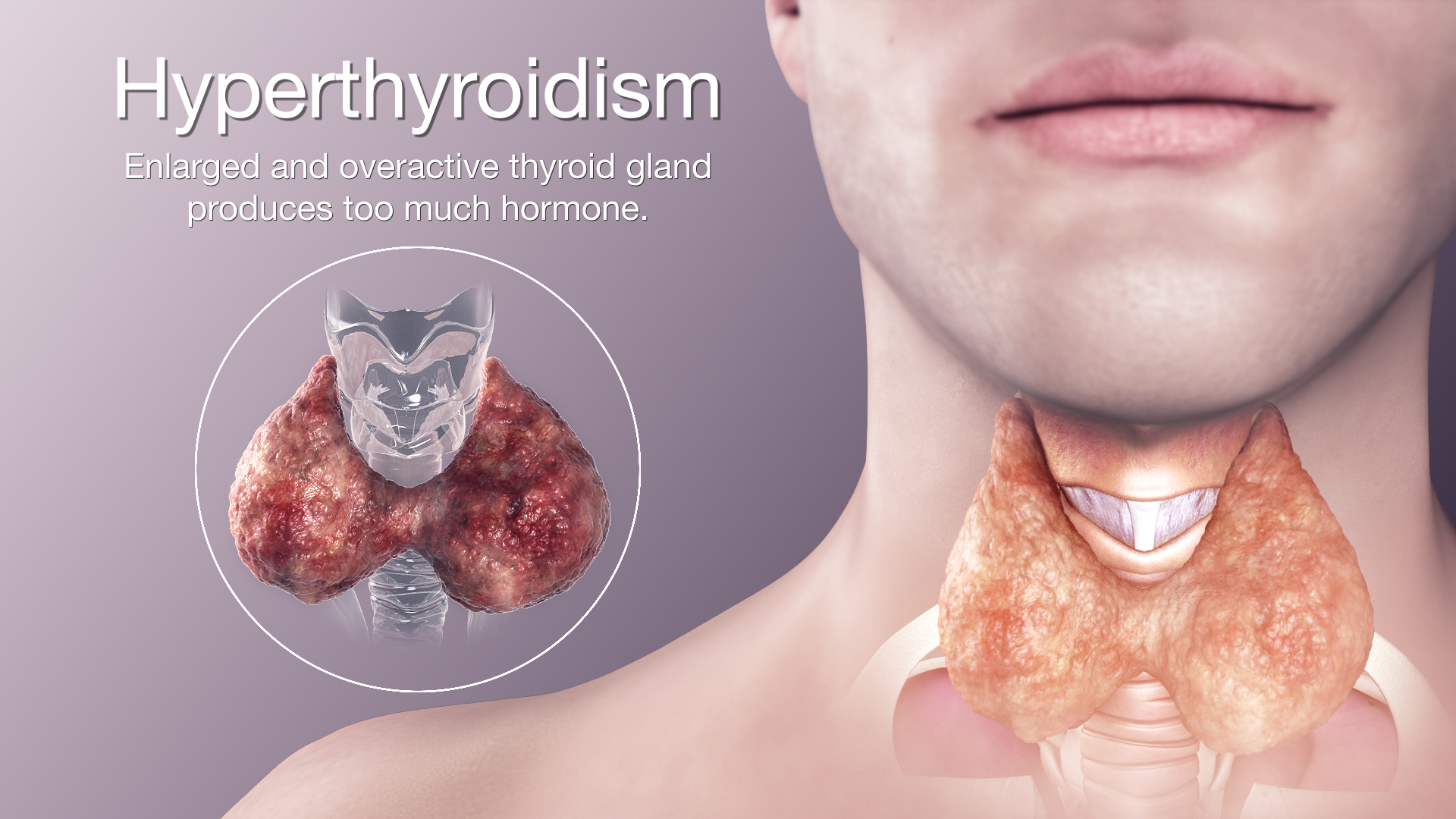Hyperthyroidism: Symptoms, Causes, Treatment
What are the symptoms of hyperthyroidism?
Hyperthyroidism, also known as an overactive thyroid, occurs when the thyroid gland produces too much thyroid hormone. This can lead to a variety of symptoms, including:
- Unexplained weight loss: Despite maintaining the same diet and eating habits, individuals with hyperthyroidism may experience significant weight loss.
- Increased appetite: Some people with hyperthyroidism may experience an increase in appetite, which can contribute to weight loss.
- Rapid or irregular heartbeat (palpitations): Hyperthyroidism can cause the heart to beat faster than normal, leading to palpitations or a feeling of a racing heart.
- Increased sweating: Excessive sweating, particularly in the palms of the hands or soles of the feet, can occur in people with hyperthyroidism.
- Nervousness, anxiety, or irritability: Hyperthyroidism can affect the nervous system, leading to symptoms such as nervousness, anxiety, or irritability.
- Tremors (shaking hands or fingers): Fine tremors, especially in the hands or fingers, can occur due to the increased metabolic rate associated with hyperthyroidism.
- Increased sensitivity to heat: People with hyperthyroidism may feel excessively warm or sweat more than usual, even in normal temperatures.
- More frequent bowel movements: Hyperthyroidism can lead to an increase in bowel movements or diarrhea.
- Fatigue or muscle weakness: Despite increased metabolism, some individuals with hyperthyroidism may experience fatigue or muscle weakness.
- Difficulty sleeping: Hyperthyroidism can disrupt normal sleep patterns, leading to insomnia.
- Thin, brittle hair: Hair may become thin, brittle, or fall out more easily in people with hyperthyroidism.
- Lighter or less frequent menstrual periods: Women with hyperthyroidism may experience changes in their menstrual cycles, including lighter or less frequent periods.
These symptoms can vary in severity and may not all be present in every individual with hyperthyroidism. If you are experiencing symptoms of hyperthyroidism, it’s important to see a healthcare provider for an evaluation and proper diagnosis.
What are the causes of hyperthyroidism?
Hyperthyroidism, or an overactive thyroid, can be caused by several factors that lead to the excess production of thyroid hormone. The most common causes of hyperthyroidism include:
- Graves’ disease: This is the most common cause of hyperthyroidism and is an autoimmune disorder in which the body’s immune system mistakenly attacks the thyroid gland, leading to an overproduction of thyroid hormone.
- Thyroid nodules: Sometimes, lumps or nodules develop in the thyroid gland, which can produce excess thyroid hormone. These nodules can be noncancerous (benign) or cancerous (malignant).
- Thyroiditis: Inflammation of the thyroid gland, which can be caused by viral infections or autoimmune conditions, can lead to a temporary increase in thyroid hormone levels.
- Excessive iodine intake: Consuming too much iodine, either through diet or medications, can lead to hyperthyroidism, especially in susceptible individuals.
- Excessive thyroid hormone intake: Taking too much thyroid hormone medication, either intentionally or inadvertently, can lead to hyperthyroidism.
- Rare causes: Less commonly, hyperthyroidism can be caused by conditions such as a pituitary gland tumor (TSH-secreting adenoma), or by certain types of thyroid cancer.
The symptoms and severity of hyperthyroidism can vary depending on the underlying cause. It’s important to see a healthcare provider for a proper diagnosis and to determine the underlying cause of hyperthyroidism, as treatment can vary depending on the specific cause.
What is the treatment for hyperthyroidism?
The treatment for hyperthyroidism aims to reduce the production of thyroid hormone and alleviate symptoms. The appropriate treatment depends on the underlying cause of hyperthyroidism, the severity of symptoms, and the individual’s overall health. Common treatments include:
- Antithyroid medications: These medications, such as methimazole (Tapazole) or propylthiouracil (PTU), work by blocking the thyroid gland’s ability to produce thyroid hormone. They are often used as a first-line treatment for hyperthyroidism, especially in cases of Graves’ disease.
- Radioactive iodine therapy: Radioactive iodine is taken orally and is absorbed by the thyroid gland, where it destroys thyroid cells. This treatment is often used to treat hyperthyroidism caused by Graves’ disease or thyroid nodules. It typically results in hypothyroidism (underactive thyroid) and may require lifelong thyroid hormone replacement therapy.
- Beta-blockers: These medications, such as propranolol or atenolol, can help relieve symptoms such as rapid heartbeat, tremors, and anxiety. They do not treat the underlying cause of hyperthyroidism but can provide symptomatic relief.
- Surgery (thyroidectomy): In some cases, surgery to remove part or all of the thyroid gland (thyroidectomy) may be recommended, especially if antithyroid medications are ineffective or if there is a large goiter (enlarged thyroid gland). Surgery may also be recommended for pregnant women with hyperthyroidism who cannot tolerate antithyroid medications or radioactive iodine therapy.
- Alternative treatments: In some cases, alternative treatments such as acupuncture, herbal supplements, or dietary changes may be used in conjunction with conventional treatments to help manage symptoms and improve overall health.
The choice of treatment depends on several factors, including the underlying cause of hyperthyroidism, the severity of symptoms, and the individual’s preferences and overall health. It’s important for individuals with hyperthyroidism to work closely with their healthcare provider to develop a treatment plan that is safe and effective for their specific needs.




